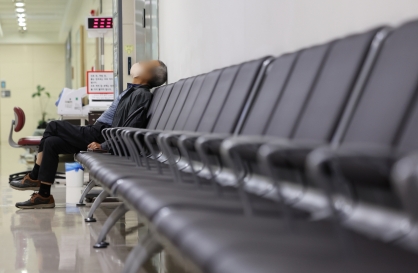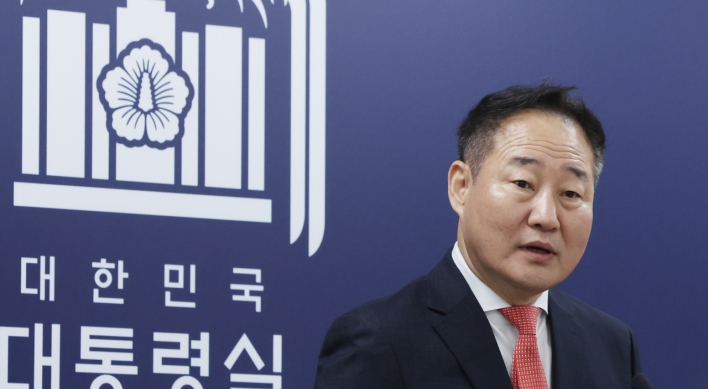Rep. Lee Sang-deuk announced Sunday he would not run for the 19th National Assembly election next April. His retirement, we believe, was four years too late.
He had been advised by people in and outside the Grand National Party to make an exit from politics when his younger brother Lee Myung-bak was elected president in December 2007. But “SD” decided to seek his sixth term ― and won it ― “to play the role of the bridge” between the new ruling party and the president, who lacked firm roots in the GNP as a transplant from the business world.
We are not sure how well Lee Sang-deuk played his bridging role over the past four years, but it is certain that his existence helped keep the distance between the president and other leaders of the party while it drifted away from public trust as factional schism widened between the pro-Lee (Myung-bak) and pro-Park (Geun-hye) groups.
As the party is being threatened to run aground with dwindling hopes for the parliamentary and presidential votes next year, Lee is blamed for misguiding his brother and resisting reform initiatives from within the party. Additionally, corruption charges are approaching him in connection with allegation that his aide received over 700 million won from businessmen. Lee claimed he was unaware of the scandal but he cited it as the reason for his retirement.
Prosecutors have just started investigation into the bribery involving the aide, and many fear that “SD” could follow the fates of those presidential relatives who were disgraced for graft in the closing phase of past presidencies, including the sons of Kim Young-sam and Kim Dae-jung and the older brother of Roh Moo-hyun.
Lee Sang-deuk has made himself available in unofficial contacts with Japanese and Chinese leaders and in “resources diplomacy” in Central Asia, the Middle East and Latin America carrying the weight of being the president’s only brother. Domestically, he was known to have exercised strong influence in the appointments to key government portfolios and semi-official posts.
Investigators suspect that Lee’s aide, named Park, received 500 million won in cash from Lee Kuk-chul, chairman of SLS Group, who allegedly sought his influence in trying to avoid a debt workout program for the group in 2009. The representative of a savings bank in Busan was also alleged to have bribed Park over prosecutors’ investigation into its business improprieties.
These businessmen are not foolish enough to believe that an aide to a lawmaker, no matter how influential his boss is, could help them on his own. Prosecutors who placed Park under detention over the weekend should conduct an exhaustive investigation to leave no doubts about the scandal. A related case involves another close aide to Lee Sang-deuk who is suspected of having been entertained lavishly by an associate of Lee Kuk-chul while on a business trip to Japan.
We have bad memories of corruption uncovered in the final year of previous single-term presidents although we hope it would not be repeated this time. Half-hearted investigations cannot clear the names of highly-placed individuals from suspicions of influence peddling. They would only create a political mess in the election year of 2012.
He had been advised by people in and outside the Grand National Party to make an exit from politics when his younger brother Lee Myung-bak was elected president in December 2007. But “SD” decided to seek his sixth term ― and won it ― “to play the role of the bridge” between the new ruling party and the president, who lacked firm roots in the GNP as a transplant from the business world.
We are not sure how well Lee Sang-deuk played his bridging role over the past four years, but it is certain that his existence helped keep the distance between the president and other leaders of the party while it drifted away from public trust as factional schism widened between the pro-Lee (Myung-bak) and pro-Park (Geun-hye) groups.
As the party is being threatened to run aground with dwindling hopes for the parliamentary and presidential votes next year, Lee is blamed for misguiding his brother and resisting reform initiatives from within the party. Additionally, corruption charges are approaching him in connection with allegation that his aide received over 700 million won from businessmen. Lee claimed he was unaware of the scandal but he cited it as the reason for his retirement.
Prosecutors have just started investigation into the bribery involving the aide, and many fear that “SD” could follow the fates of those presidential relatives who were disgraced for graft in the closing phase of past presidencies, including the sons of Kim Young-sam and Kim Dae-jung and the older brother of Roh Moo-hyun.
Lee Sang-deuk has made himself available in unofficial contacts with Japanese and Chinese leaders and in “resources diplomacy” in Central Asia, the Middle East and Latin America carrying the weight of being the president’s only brother. Domestically, he was known to have exercised strong influence in the appointments to key government portfolios and semi-official posts.
Investigators suspect that Lee’s aide, named Park, received 500 million won in cash from Lee Kuk-chul, chairman of SLS Group, who allegedly sought his influence in trying to avoid a debt workout program for the group in 2009. The representative of a savings bank in Busan was also alleged to have bribed Park over prosecutors’ investigation into its business improprieties.
These businessmen are not foolish enough to believe that an aide to a lawmaker, no matter how influential his boss is, could help them on his own. Prosecutors who placed Park under detention over the weekend should conduct an exhaustive investigation to leave no doubts about the scandal. A related case involves another close aide to Lee Sang-deuk who is suspected of having been entertained lavishly by an associate of Lee Kuk-chul while on a business trip to Japan.
We have bad memories of corruption uncovered in the final year of previous single-term presidents although we hope it would not be repeated this time. Half-hearted investigations cannot clear the names of highly-placed individuals from suspicions of influence peddling. They would only create a political mess in the election year of 2012.






![[K-pop’s dilemma] Can K-pop break free from ‘fandom’ model?](http://res.heraldm.com/phpwas/restmb_idxmake.php?idx=644&simg=/content/image/2024/05/09/20240509050541_0.jpg&u=20240509173751)











